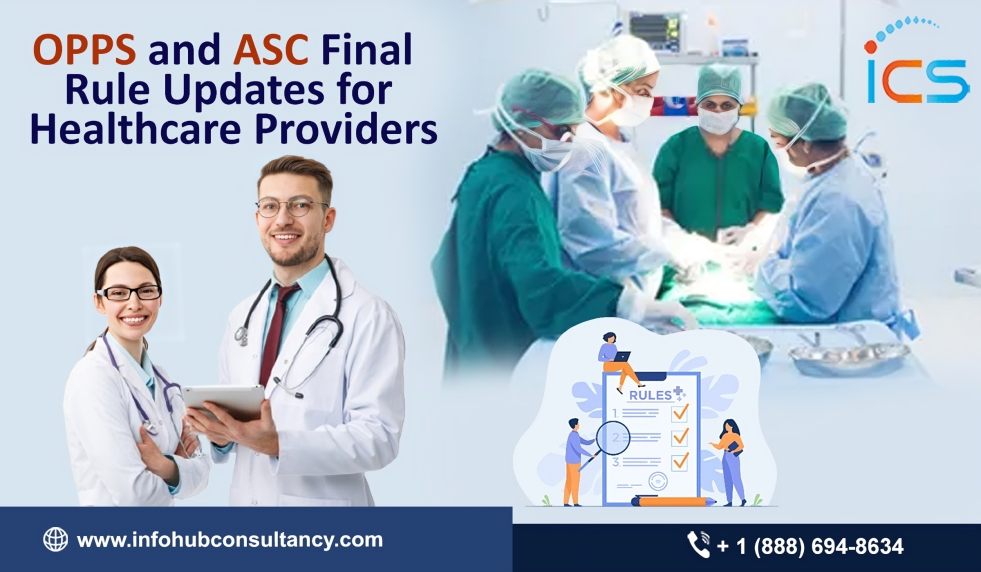Introduction:
The annual updates to the Outpatient Prospective Payment System (OPPS) and Ambulatory Surgical Center (ASC) Final Rule have far-reaching effects on healthcare providers, impacting reimbursement models, coverage policies, and compliance requirements. These changes are designed to enhance the efficiency of outpatient care, ensuring cost-effective service delivery while maintaining quality. For providers, especially those involved in ASC billing and coding services, staying compliant with these updates is crucial to optimizing revenue and reducing claim denials.
Understanding OPPS and ASC Payment Systems
OPPS and ASC payment structures dictate how outpatient services are reimbursed under Medicare. The OPPS follows a bundled payment model for hospital outpatient departments, while the ASC system operates independently, covering procedures performed in freestanding surgical centers. Both models are intended to encourage cost efficiency and improved patient outcomes. The 2025 updates introduce revised reimbursement rates and expanded procedural coverage, significantly impacting billing operations.
Major Changes in the 2025 OPPS and ASC Final Rule
The Centers for Medicare & Medicaid Services (CMS) have rolled out essential modifications for 2025, affecting financial structures and procedural workflows in outpatient care. Key updates include:
- Payment rate adjustments with a 2.6% increase in OPPS and ASC reimbursement rates.
- Expanded procedure list allowing more cardiovascular and orthopedic surgeries in ASCs.
- Enhanced quality reporting under the Hospital Outpatient Quality Reporting (OQR) and ASC Quality Reporting (ASCQR) programs.
- Modifications in telehealth policies, expanding virtual care services beyond the Public Health Emergency.
Financial Impact on Healthcare Providers
The 2025 payment rate adjustments bring both opportunities and challenges for ASCs and hospital outpatient departments (HOPDs). The reimbursement increase aims to support cost-efficient surgical care, but compliance with quality measures is essential to fully benefit from these updates.
- HOPDs: Payment adjustments are based on the complexity of cases, with new policies affecting site-neutral payments and reimbursement for off-campus provider-based departments.
- ASCs: Facilities that meet specific quality benchmarks will receive the full 2.6% rate increase, reinforcing the need for accurate billing and documentation.
Importance of Quality Reporting and Compliance
CMS has expanded reporting requirements, making data collection and compliance a critical aspect of revenue cycle management. ASCs must now report more details on:
- Patient safety and surgical outcomes
- Efficiency metrics for cost-effectiveness
- Documentation accuracy to meet new billing standards
Outsourcing ASC billing and coding services to experts can ensure compliance with these evolving regulations while reducing administrative burden.
Expanded Coverage for ASC Procedures
One of the most significant changes is the inclusion of more complex procedures in the ASC setting. CMS has authorized additional cardiovascular and orthopedic surgeries for ASCs, providing cost savings for both patients and payers. This shift emphasizes the importance of efficient billing processes to maximize reimbursement for newly approved services.
Telehealth and Remote Monitoring Enhancements
Telehealth remains a priority, with CMS extending reimbursement flexibilities for virtual care. The new rule introduces expanded coverage for remote patient monitoring, allowing ASCs and outpatient providers to incorporate digital health solutions. Billing for these services requires precise coding updates, making ASC billing outsourcing a strategic move for error-free claims.
Impact on Rural and Critical Access Hospitals
The 2025 updates include targeted support for rural healthcare providers. CMS has implemented:
- Increased funding for Critical Access Hospitals (CAHs) to sustain essential outpatient services.
- Incentives for telehealth expansion, improving care accessibility in remote areas.
- Revised payment methodologies to maintain financial stability for rural healthcare facilities.
Compliance and Documentation Requirements
Ensuring compliance with the new OPPS and ASC Final Rule requires healthcare providers to:
- Stay updated on coding modifications, including changes to CPT, HCPCS, and ICD-10 codes.
- Maintain accurate documentation to meet quality reporting and reimbursement criteria.
- Train staff on evolving billing guidelines to prevent denials and payment delays.
Outsourcing ASC billing and coding services to professionals can streamline these processes, helping facilities navigate regulatory changes efficiently.
Strategies for Adapting to the New Reimbursement Model
Healthcare providers must embrace new strategies to optimize financial performance under the revised OPPS and ASC rules. Key approaches include:
- Investing in revenue cycle management (RCM) technology to automate claims processing and reduce errors.
- Enhancing documentation accuracy to align with new reporting and compliance standards.
- Utilizing data analytics to monitor financial health, track reimbursements, and improve operational efficiency.
Benefits of OPPS and ASC Updates for Patients
The latest OPPS and ASC changes aim to improve patient experiences by:
- Lowering out-of-pocket costs for select ASC procedures.
- Expanding access to outpatient surgical services by broadening coverage policies.
- Enhancing pricing transparency, allowing patients to make informed healthcare decisions.
Role of Technology in Compliance and Billing Efficiency
Leveraging technology is essential in adapting to OPPS and ASC changes. Hospitals and ASCs can optimize their operations by:
- Implementing AI-driven billing software to minimize claim rejections.
- Integrating electronic health records (EHRs) for accurate patient data tracking.
- Automating compliance monitoring to ensure adherence to the latest CMS regulations.
FAQ:
Q1: What is the OPPS Final Rule?
A: It’s an annual update from CMS that establishes payment rates and policies for hospital outpatient departments.
Q2: How does the ASC Final Rule impact surgical centers?
A: It revises reimbursement rates, expands covered procedures, and updates quality reporting guidelines.
Q3: What are the key financial changes for 2025?
A: A 2.6% increase in OPPS and ASC payments, contingent on meeting quality reporting standards.
Q4: How can healthcare providers ensure compliance?
A: By updating coding systems, improving documentation accuracy, and leveraging outsourced billing services.
Conclusion:
Healthcare providers must proactively adapt to OPPS and ASC Final Rule updates by improving compliance, leveraging technology, and optimizing billing practices. The 2025 changes emphasize efficiency, coverage expansion, and enhanced quality reporting. Outsourcing Medical billing and coding services can help providers navigate these complexities, ensuring accurate claims processing and maximizing revenue potential.
Partner with Info Hub Consultancy Services for reliable and expert-driven ASC billing and coding solutions. Our team ensures seamless compliance, optimized revenue cycle management, and accurate claims processing. Contact us today to streamline your billing operations and enhance financial performance!

 Medical Billing
Medical Billing  5 mins read
5 mins read 










